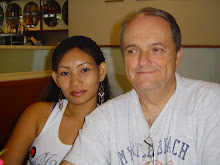Learning a new language
(Ayutthaya, Thailand)
Learning a new language is like
a wave moving from ocean
to shore.
New words,
drawn by the moon, rise
in our consciousness only
to ease gently back
into the unfathomable deep
as the wave passes.
But in time this
wave of words curls and
gains velocity until it
smashes onto the rocks
in an éclat of foam and spray
and we claim a new continent
as our own.
FG 4 May 2011
All rights reserved by the author Forrest Greenwood.
On Learning Thai (Chong Khae, Thailand)
Forty-four consonants with classy names
like snake, rat, and a little boat you row
not to say anything of old geezer which
my Thai wife’s four-year old granddaughter
with Shirley Temple curls says I am.
Thirty-two vowels which orbit the consonants like planets.
They wax and wane and sometimes go into retrograde
So severe they disappear. Most of these make noises
I last made during a physical exam when the rubber-gloved
doctor digitally checked my prostrate: Vowel E-U-U-U-A!
Five different tones, so it’s OK to have
high tones in low places and a funny mix of
four tone markers – one of which is the logo
for the International Red Cross – wait a minute,
five tones but only four markers?. Who invented
this language, Yogi Berra?
There are no capitals, but that’s OK because
there’s no punctuation, either. thaitextexudeslikea
sausagefromamachineinastraightlinesuntilitstopskhrap
I don’t think this farang will ever master Thai.
English may be crazy, but Thai needs another adjective
altogether khrap . . . (the last I think, comes close).
All rights reserved by Forrest Greenwood Fgreenwood@Yahoo.com
Kkrab is the male particle of politeness used at the end of a sentence or phrase. Kha is the female equivalent.
Learning a new language is like
a wave moving from ocean
to shore.
New words,
drawn by the moon, rise
in our consciousness only
to ease gently back
into the unfathomable deep
as the wave passes.
But in time this
wave of words curls and
gains velocity until it
smashes onto the rocks
in an éclat of foam and spray
and we claim a new continent
as our own.
FG 4 May 2011
All rights reserved by the author Forrest Greenwood.
On Learning Thai (Chong Khae, Thailand)
Forty-four consonants with classy names
like snake, rat, and a little boat you row
not to say anything of old geezer which
my Thai wife’s four-year old granddaughter
with Shirley Temple curls says I am.
Thirty-two vowels which orbit the consonants like planets.
They wax and wane and sometimes go into retrograde
So severe they disappear. Most of these make noises
I last made during a physical exam when the rubber-gloved
doctor digitally checked my prostrate: Vowel E-U-U-U-A!
Five different tones, so it’s OK to have
high tones in low places and a funny mix of
four tone markers – one of which is the logo
for the International Red Cross – wait a minute,
five tones but only four markers?. Who invented
this language, Yogi Berra?
There are no capitals, but that’s OK because
there’s no punctuation, either. thaitextexudeslikea
sausagefromamachineinastraightlinesuntilitstopskhrap
I don’t think this farang will ever master Thai.
English may be crazy, but Thai needs another adjective
altogether khrap . . . (the last I think, comes close).
All rights reserved by Forrest Greenwood Fgreenwood@Yahoo.com
Kkrab is the male particle of politeness used at the end of a sentence or phrase. Kha is the female equivalent.


0 Comments:
Post a Comment
Subscribe to Post Comments [Atom]
<< Home